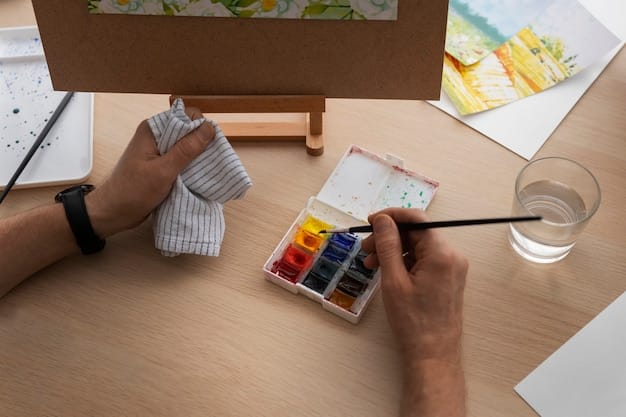Integrate Spiritual Practices: Transform Your Daily Life

Integrating spiritual practices into your daily routine involves incorporating mindfulness, meditation, prayer, or other rituals that foster inner peace and connection, leading to lasting personal transformation.
Are you seeking a deeper sense of purpose and fulfillment in your life? Discover how to integrate spiritual practices into your daily routine for lasting transformation. By incorporating simple yet powerful techniques, you can cultivate inner peace, enhance self-awareness, and experience a profound connection to something greater than yourself.
Start Your Day with Intention: Morning Spiritual Rituals
Beginning your day with intention sets a positive tone and aligns your focus. Incorporating spiritual rituals into your morning routine can help you center yourself, reduce stress, and enhance your sense of purpose before the demands of the day take over.
Mindful Meditation
Spending just a few minutes in mindful meditation can significantly impact your day. Focus on your breath, observe your thoughts without judgment, and allow yourself to be present in the moment.
Gratitude Practice
Cultivating gratitude is a powerful way to shift your perspective and appreciate the blessings in your life. Take time each morning to reflect on what you’re thankful for.
- Write in a gratitude journal
- Express gratitude to loved ones
- Reflect on positive experiences
By starting your day with intention and incorporating simple spiritual rituals, you can create a foundation of peace, clarity, and purpose that supports you throughout the day.

Incorporate Mindfulness Throughout Your Day
Mindfulness involves being fully present in each moment, paying attention to your thoughts, feelings, and surroundings without judgment. By intentionally incorporating mindfulness into your daily activities, you can reduce stress, enhance self-awareness, and deepen your connection to the present moment.
Mindful Eating
Transform meals into opportunities for mindfulness by savoring each bite, paying attention to the flavors and textures, and eating without distractions.
Mindful Walking
Walking can be a form of moving meditation. As you walk, focus on the sensations in your body, the rhythm of your steps, and the details of your surroundings.
- Pay attention to your breath
- Observe the sights, sounds, and smells around you
- Feel the ground beneath your feet
By practicing mindfulness throughout your day, you can cultivate a greater sense of presence, reduce stress, and increase your overall well-being.
Connect with Nature: Rejuvenate Your Spirit
Spending time in nature has profound benefits for your mental, emotional, and spiritual well-being. Connecting with the natural world can help you feel grounded, reduce stress, and experience a deeper sense of awe and wonder.
Nature Walks
Take regular walks in parks, forests, or along the beach. Immerse yourself in the beauty of nature, paying attention to the sights, sounds, and smells.
Gardening
Gardening is a therapeutic activity that connects you to the earth and allows you to nurture life. Whether you have a large garden or a small indoor plant, caring for plants can bring peace and joy.
- Plant flowers or vegetables
- Water and tend to your plants
- Observe the growth process
By connecting with nature, you can rejuvenate your spirit, reduce stress, and experience a deeper sense of connection to the world around you.
Practice Self-Compassion: Nurture Your Inner Self
Self-compassion involves treating yourself with kindness, understanding, and acceptance, especially during difficult times. By practicing self-compassion, you can cultivate greater resilience, reduce self-criticism, and enhance your overall well-being.
Mindful Self-Compassion Exercises
Engage in mindful self-compassion exercises, such as the self-compassion break, to acknowledge your suffering, recognize your shared humanity, and offer yourself kindness.
Positive Self-Talk
Replace negative self-talk with positive affirmations and encouraging statements. Speak to yourself as you would to a dear friend.
- Acknowledge your strengths
- Forgive yourself for mistakes
- Celebrate your accomplishments
By practicing self-compassion, you can nurture your inner self, reduce self-criticism, and cultivate a greater sense of self-acceptance.
Express Creativity: Unleash Your Inner Artist
Engaging in creative activities can be a powerful way to connect with your inner self, express your emotions, and tap into your intuition. Whether you consider yourself an artist or not, exploring your creativity can bring joy, fulfillment, and spiritual growth.
Creative Writing
Journaling, poetry, and storytelling can help you explore your thoughts and feelings, gain clarity, and express yourself in a meaningful way.
Visual Arts
Painting, drawing, sculpting, and photography can be powerful mediums for self-expression and spiritual exploration. Experiment with different materials and techniques to discover what resonates with you.

- Try different artistic mediums
- Express your emotions through art
- Let go of perfectionism
By expressing your creativity, you can unleash your inner artist, connect with your emotions, and cultivate a deeper sense of self-discovery.
Reflect and Journal: Integrate Spiritual Insights
Reflection and journaling are powerful tools for integrating spiritual insights into your daily life. By taking time to reflect on your experiences, you can gain clarity, identify patterns, and deepen your understanding of yourself and the world around you.
Reflective Practices
Set aside time each day to reflect on your experiences, thoughts, and feelings. Consider what you’ve learned, what challenges you’ve faced, and what insights you’ve gained.
Journaling Techniques
Experiment with different journaling techniques, such as freewriting, gratitude journaling, and reflective prompts, to explore your inner landscape and integrate spiritual insights.
- Write about your dreams
- Explore your values and beliefs
- Reflect on your relationships
By reflecting and journaling, you can integrate spiritual insights into your daily life, gain clarity, and cultivate a deeper sense of self-awareness.
Evening Rituals: Wind Down with Gratitude
Establishing evening rituals centered around gratitude and reflection can help you wind down, release stress, and prepare for a restful night’s sleep. These moments of introspection allow you to process the day’s events and cultivate a sense of peace before drifting off to sleep.
Gratitude Review
Before going to bed, take a few moments to review your day and identify the things you’re grateful for. This could be as simple as acknowledging a kind gesture from a stranger or appreciating a beautiful sunset.
Gentle Stretching or Yoga
Engaging in gentle stretching or yoga poses can help release tension in your body and calm your mind. Simple stretches or restorative poses can promote relaxation and prepare you for sleep.
- Reflect on positive moments
- Release any lingering stress
- Express gratitude for blessings
By ending your day with gratitude and gentle self-care, you can promote restful sleep and wake up feeling refreshed and ready to embrace the new day with a centered spirit.
| Key Point | Brief Description |
|---|---|
| 🧘 Morning Rituals | Start with intention: meditation, gratitude. |
| 🍃 Mindfulness | Be present: mindful eating, walking. |
| 🎨 Creativity | Express yourself: writing, visual arts. |
| 🌙 Evening Gratitude | Reflect, be grateful, and relax peacefully |
FAQ
▼
Integrating spiritual practices can enhance your well-being, reduce stress, increase self-awareness, and foster a deeper connection to yourself and the world around you. It promotes inner peace and fulfillment.
▼
You can start with basic practices like mindful meditation, gratitude journaling, spending time in nature, or practicing self-compassion. These are easy to incorporate into your daily routine.
▼
Even just a few minutes each day can make a significant difference. Start with 5-10 minutes and gradually increase the time as you become more comfortable and experience the benefits.
▼
It’s okay to miss a day. Be kind to yourself and simply resume your practice the next day. Consistency is important, but don’t beat yourself up for occasional lapses.
▼
You may notice subtle changes in your mood, stress levels, and overall well-being. Pay attention to how you feel throughout the day and reflect on any positive changes you’ve experienced.
Conclusion
Integrating spiritual practices into your daily routine is a journey of self-discovery and transformation. By incorporating mindfulness, gratitude, creativity, and self-compassion, you can cultivate a deeper sense of purpose, enhance your well-being, and experience lasting personal growth. Start small, be consistent, and embrace the process with patience and an open heart.





